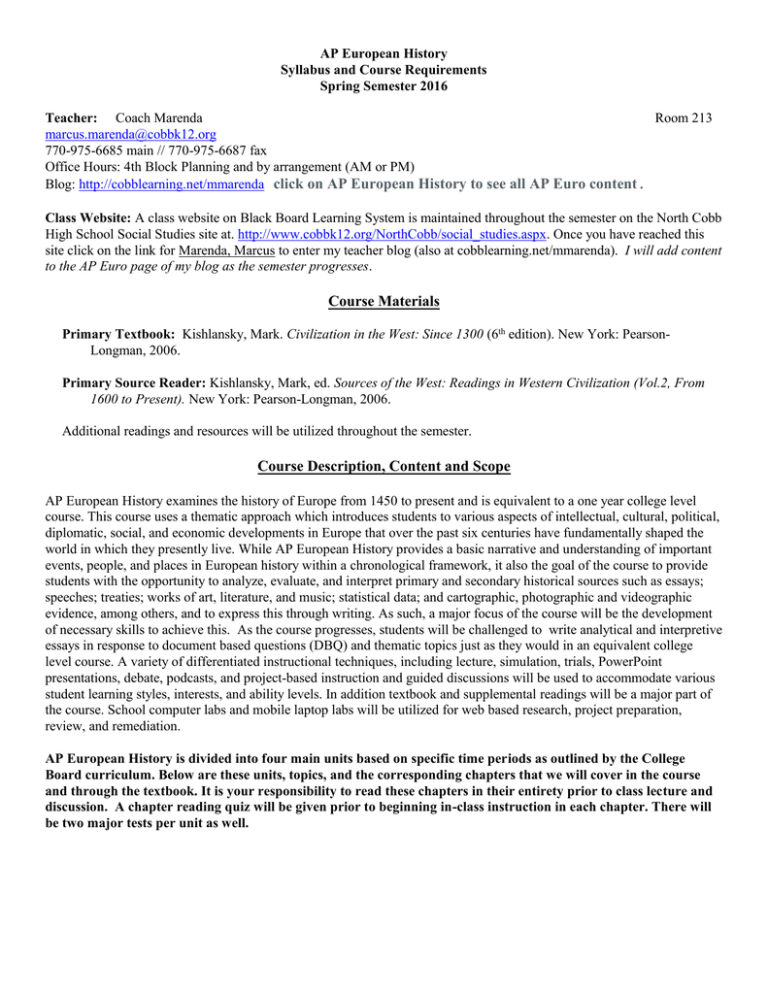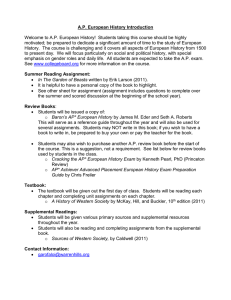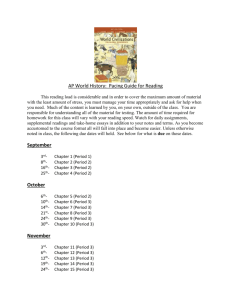
AP European History
Syllabus and Course Requirements
Spring Semester 2016
Teacher: Coach Marenda
Room 213
marcus.marenda@cobbk12.org
770-975-6685 main // 770-975-6687 fax
Office Hours: 4th Block Planning and by arrangement (AM or PM)
Blog: http://cobblearning.net/mmarenda click on AP European History to see all AP Euro content.
Class Website: A class website on Black Board Learning System is maintained throughout the semester on the North Cobb
High School Social Studies site at. http://www.cobbk12.org/NorthCobb/social_studies.aspx. Once you have reached this
site click on the link for Marenda, Marcus to enter my teacher blog (also at cobblearning.net/mmarenda). I will add content
to the AP Euro page of my blog as the semester progresses.
Course Materials
Primary Textbook: Kishlansky, Mark. Civilization in the West: Since 1300 (6th edition). New York: PearsonLongman, 2006.
Primary Source Reader: Kishlansky, Mark, ed. Sources of the West: Readings in Western Civilization (Vol.2, From
1600 to Present). New York: Pearson-Longman, 2006.
Additional readings and resources will be utilized throughout the semester.
Course Description, Content and Scope
AP European History examines the history of Europe from 1450 to present and is equivalent to a one year college level
course. This course uses a thematic approach which introduces students to various aspects of intellectual, cultural, political,
diplomatic, social, and economic developments in Europe that over the past six centuries have fundamentally shaped the
world in which they presently live. While AP European History provides a basic narrative and understanding of important
events, people, and places in European history within a chronological framework, it also the goal of the course to provide
students with the opportunity to analyze, evaluate, and interpret primary and secondary historical sources such as essays;
speeches; treaties; works of art, literature, and music; statistical data; and cartographic, photographic and videographic
evidence, among others, and to express this through writing. As such, a major focus of the course will be the development
of necessary skills to achieve this. As the course progresses, students will be challenged to write analytical and interpretive
essays in response to document based questions (DBQ) and thematic topics just as they would in an equivalent college
level course. A variety of differentiated instructional techniques, including lecture, simulation, trials, PowerPoint
presentations, debate, podcasts, and project-based instruction and guided discussions will be used to accommodate various
student learning styles, interests, and ability levels. In addition textbook and supplemental readings will be a major part of
the course. School computer labs and mobile laptop labs will be utilized for web based research, project preparation,
review, and remediation.
AP European History is divided into four main units based on specific time periods as outlined by the College
Board curriculum. Below are these units, topics, and the corresponding chapters that we will cover in the course
and through the textbook. It is your responsibility to read these chapters in their entirety prior to class lecture and
discussion. A chapter reading quiz will be given prior to beginning in-class instruction in each chapter. There will
be two major tests per unit as well.
AP Euro Syllabus Page 2 of 6
Course Topics and Textbook Chapters
Unit 1: 1450-1648
Chapter 10 - The Later Middle Ages: 1300-1500
Chapter 11 - The Renaissance
Chapter 12 - The European Empires
Chapter 13 - The Reform of Religion
Chapter 14 - Europe at War: 1555-1648
Chapter 15 - The Experiences of Life in Early Modern
Europe: 1500-1650
Unit 3: 1815-1914
Chapter 21 –Industrial Europe
Chapter 22 – Political Upheavals and Social
Transformations: 1815-1850
Chapter 23 – State Building and Social Change in
Europe: 1850 - 1871
Chapter 24 – The Crisis of European Culture: 18711914
Chapter 25 – Europe and the World: 1871-1914
Unit 2: 1648-1815
Chapter 16 - The Royal State in Seventeenth Century
Chapter 17 - Science and Commerce in Early Modern
Europe
Chapter 18 - The Balance of Power in EighteenthCentury Europe
Chapter 19 - Culture and Society in Eighteenth-Century
Europe
Chapter 20 - The French Revolution and the Napoleonic
Era: 1789-1815
Unit 4: 1914 - Present
Chapter 26 – War and Revolution: 1914-1920
Chapter 27 – The European Search for Stability: 19201939
Chapter 28 – Global Conflagration: World War II :
1939-1945
Chapter 29 – The Cold War and Postwar Economic
Recovery: 1945-1970
Chapter 30 - The End of the Cold War and New Global
Challenges: 1970 to the Present
Grading Criteria
Grading: A variety of assessments will be utilized throughout the course: Below are the criteria:
Reading Quizzes, Class Assignments, Cultural Events/Presentations and Homework
25%
Unit Tests, Essays, DBQ’s, Student Project(s) & Supplemental Readings
60%
Final Exam
15%
Reading Quizzes, Class Assignments, Homework – 25%, There will be reading quizzes on each chapter listed on the
Course Assignment and Reading Guide. Students are expected to have read in advance these and additional assigned
supplemental readings according to the schedule. You will also be expected to have responded to questions and/or
other assignments related to the reading. In addition to the textbook and primary reader listed above, an array of
supplemental readings, and instructional resources including; pictorial and graphic materials, maps, statistical tables,
works of art, and various audio-visual materials will also be utilized and assessed. Many of these are listed at the end of
this syllabus but others will be added. Additionally, throughout the semester students will complete class assignments
and homework which will be assessed according to the above scale.
Unit Tests, Essays, Projects, and Supplemental Readings – 60%
Unit Tests - Several major unit tests will be given at throughout the semester generally at the midpoint and end of
each major unit as defined in the Course Assignment and Reading Guide below. These tests will include
information from lectures, class notes, presentations, classroom activities and discussions; textbook and
supplemental readings: and audio/visuals materials. All tests will consists of a Multiple Choice section similar to
that included on the official College Board AP Exam. These questions will include 5 possible answers and will
include varying levels of cognitive questioning to ensure that students utilize appropriate basic and critical thinking
skills. Additionally, free response and DBQ’s may be included on some tests to ensure that students have the
opportunity to address these type of questions under testing conditions similar of the official College Board AP
Exam. Students will have been instructed and practiced on these skills in class prior to the tests. As we progress
through the course and review for the exam there will be more frequent independent writing exercises with DBQ’s
and free response essay questions to provide individual intellectual growth and to prepare for the AP Exam.
AP Euro Syllabus Page 3 of 6
Supplemental Readings – Several supplemental readings related to the topic at hand will be assigned throughout
the semester. Each reading has accompanying questions. These questions, answered fully and demonstrating strong
understanding of the reading, will be due on specific dates throughout the semester. In order to receive full credit
they must be turned into the class assignment bin at the beginning of the class period due. There may also be class
discussions related to the readings in which students will be expected to participate. Collectively, the grades from
these reading questions and discussions will count for one major test grade.
Projects – There will be student projects assigned during the semester. These projects will be both individual and
collaborative and will count as major test grades.
Final Exam 15% – A cumulative final exam will be administered at the end of the semester according to district policy.
This exam will count for 15% of the final semester grade. The AP Exam will not be included in the final grade.
Grades will be cumulative throughout the semester and students will receive district mandated 6 and 12 week progress
reports showing their progress towards the final semester grade. All assessments will be posted on a regular and timely
manner on the district’s Pinnacle student information system for parents and students. Students and parents are
provided with individual login information at the beginning of each school year.
Class Requirements and Expectations
Materials:
1. You will need a 3-hole notebook in which to keep classroom and homework activities as well as class notes. These
notebooks should be organized, orderly, and up to date, and should be always brought to class. Be sure to include
plenty of paper for taking notes, writing, etc.
2. You should always bring your textbook to class unless otherwise instructed.
3. You need to always bring a black or blue pen and #2 pencil to class.
Classroom Expectations: BE P!
1. Be Punctual: Be in your seat and ready to go when the tardy bell rings.
2. Be Prepared: Bring you textbook, notebook, and pen/pencil to class every day. Come to class having done your prereading and with your questions and notes about the material.
3. Be Professional: You are young adults. Please act as such and be respectful for the rights others in the class. Take
responsibility for yourself. It is your responsibility to obtain any assignments that you have missed. It is your
responsibility to schedule for make-up tests, quizzes, etc.
5. Be Perspicacious: The best way to be successful in this class is to be actively involved. This is not only my
classroom, it is also yours. Please feel comfortable with me and with others and have fun.
6. Adhere to all other rules as stated in the student handbook.
Academic Honesty
All students are expected to abide by the Cobb County School District policies regarding academic honesty. Any
copied, shared, plagiarized, or otherwise dishonest work will receive a grade of 0% on the first offence. Further
offences will be handled by administrative referral. See the Academic Integrity statement below.
Office Hours
I am in the classroom between 7:45 and 8:15 AM on Tuesdays through Friday and am available after school on
Tuesday and Thursday from 3:30 until 4:45 PM. (Please check with me before coming in at any other time; I may
have prior commitments.) I am also available via email and the class blog, although any late-night communication
will not be addressed until the following morning.
Assignments
If a homework assignment is being collected it is due in the class homework bin at the beginning of class. If a student
misses a class because they were late to school or dismissed early, then they are responsible for handing in their
assignment the same day upon their arrival to school. Students who have excused absences may turn in any
AP Euro Syllabus Page 4 of 6
assignment which was due during their absence—as well as any further assignments which were missed—the next
time class meets. Students are responsible for getting notes and assignments from their classmates or by checking the
class blog. Please label any make-up work by writing “MAKE-UP WORK” in the top right hand corner of your
papers before turning it in to the class bin.
1. Any assignment not turned in on time may be turned in by the end of the next consecutive calendar day for
partial credit (a 20% deduction from the initial grade). Please label any late work by writing “LATE
WORK” in the top right hand corner of your paper before turning it in to the class bin. Please be aware that
homework is not simply checked for completion; a late assignment could conceivably earn less than 50% if it is
incomplete or lacking in quality.
2. Assignments should be written in pencil or black/blue ink pen on white college-ruled notebook paper (8 ½ x 11).
Assignments should be neat, legible, and clearly labeled. Please write your name, the date, and class period in
the upper right hand corner of your paper and the title of the assignment on the first line of your paper before
turning in any assignments.
3. In-class essays are handwritten on notebook paper, in blue or black ink only—no pencil. Essays assigned for
homework may be typed in Times New Roman, 12pt. font and double spaced, and shall be submitted
electronically by the due date. For handwritten assignments, please keep in mind that your handwriting MUST
be legible. You will not be able to translate for your AP grader, so it’s best to get into the habit of writing
neatly now.
AP EXAM: This year’s AP European History Exam will be on Friday, May 6, 2016 at 12:00 Noon.
Each of the FOUR Unites (1, 2, 3, 4) covered in the course will be given equal treatment on the exam. However,
it is possible that a unit is only treated in the essays, thus there could be few or no multiple choice questions on
the exam which pertain to a unit.
Part I – (100 Minutes) –
A 55 Multiple choice questions. Approximately 10-20 questions from each period (Units 1, 2, 3,
4) (50 minutes, and worth 40% of the exam)
B 4 Short answer questions (SAQ) of which you will answer all prompts (50 minutes, and worth
20% of the exam)
Part II – (90 Minutes) –
A 1 Document based question (DBQ) (55 minutes, and worth 25% of the exam)
B 1 Long essay question (LEQ) selected from 2 choices (35 minutes, and worth 15% of the
exam)
Note: Since you do not receive the AP Exam scores until summer, your grade on that Exam will not be
considered in your final class grade.
General Information on the DBQ
The required DBQ differs from the standard essays in its emphasis on your ability to analyze and synthesize historical
data and assess verbal, quantitative, or pictorial materials as historical evidence. Like the standard essays, however,
the DBQ is judged on its thesis and argument. Although confined to no single format, the documents are unlikely to
be the familiar classics (such as the Emancipation Proclamation or the Declaration of Independence), but their authors
may be major historical figures. The documents vary in length and are chosen to illustrate the interactions and
complexities of the historical process. They may include charts, graphs, cartoons, and pictures, as well as written
materials. The DBQ typically requires students to relate the documents to a historical period or theme and thus to
AP Euro Syllabus Page 5 of 6
focus on major periods and issues. For this reason, outside knowledge -- information gained from materials other than
the documents
AP Exam Reviews
In preparation for the AP Exam we will begin scheduled review sessions after spring break, either before or after
school. Announcements for the time of the reviews will be forthcoming in spring. If you are a first semester student
this will take commitment on your part since in-class reviews just prior to the exam will not be applicable to you
although you are welcome to join any such sessions if your schedule allows.
Additional Resources Utilized in AP European History Course
Primary Sources and Study Guides
Brautigam, Jeffrey. 5 Steps to a 5: AP European History 2010-2011. Boston: McGraw-Hill. 2010.
Cummings, Robert. Annotated Art: The World’s Greatest Paintings Explored and Explained. London. DK Publishing.
1995.
Freiler, Chris. AP Achiever: European History. (10th Edition). Boston: McGraw-Hill. 2008.
Kendrick, M. Gregory, Documents of Western Civilization, Vol II: 1550 to Present. Belmont: West/Wadsworth. 1999.
Kishlansky, Mark A. Sources of World History, Vol. 1 (2nd Edition). Belmont: West Wadsworth. 1999.
Kishlansky, Mark A. Sources of World History, Vol. II (2nd Edition). Belmont: West Wadsworth. 1999.
Lembright. Robert L. Annual Editions (14th Edition): Western Civilization Volume 2: Early Modern Through the 20 th
Century. Dubeque: McGraw Hill. 2007.
McKay, John P. A History of Western Civilization. Boston: Bedford/St. Martin’s. 2011.
O’Conner, John. Teaching History with Film and Television. Washington, D.C. American Historical Association.
Palmer, R.R. History of the Modern World, (10th Edition). Boston: McGraw- Hill.
Sherman, Dennis. Western Civilization: Sources, Images and Interpretations, Volumes I and II. Boston: McGraw-Hill.
The College Board. AP European History: 2009 Released Exam. New York. 2010.
The College Board. AP European History: 1999 Released Exam. New York. 1999.
The College Board. AP European History: Workshop Handbook 2010-2011. New York. 2010.
The College Board. AP European History: Professional DevelopmentThematic Approaches Curriculum Module. New
York. 2010
AP Euro Syllabus Page 6 of 6
Electronic Resources/Websites
Eurodocs. EuroDocs: Online Sources for European History: Selected Transcriptions, Facsimiles and Translations.
http://eudocs.lib.byu.edu/index.php/Main_Page.
The History Sage.com – Steven Mecardo. Lecture Notes. http://historysage.com
Internet History Sourcebooks Project: Fordham University. Paul Halsall, Editor.
http://www.fordham.edu/Halsall/index.asp.
Rand McNalley Classroom: http://education.randmcnally.com/classroom/getWelcomePage.do
The College Board: AP Central http://apcentral.collegeboard.com/apc/public/courses/teachers_corner/2122.html
ACADEMIC INTEGRITY:
Cheating is considered a serious matter. The act of cheating will result in a disciplinary referral. The first incidence does
not carry a disciplinary consequence with the administrator, just a conference. In any incidence, the parents of a student
who has been involved in cheating will be notified and the student will receive a grade of zero for the test or evaluation
period, and a grade of U in conduct.
For this course, cheating is defined as, but is not limited to, the following acts:
Copying anyone’s answers to questions, exercises, study guides, classwork or homework assignments
Taking any information verbatim from any source, including the Internet, without giving proper credit to the
author, or rearranging the order of words and/or changing some words as written by the author and claiming
the work as his or her own, i.e., plagiarism.
Looking onto another student’s paper during a test or quiz.
Having available any study notes or other test aids during a test or quiz without the teacher's permission.
Collaborating on assignments when independent work is expected.
Making any effort to communicate the contents of assessment questions or answers through use of cell phone
texting, photography, social networking sites, or other related technology.
Using a cell phone or camera at any point during a test or assessment without express permission of the instructor.
Please sign the following as an acknowledgement of the policies and procedures listed above, and keep this syllabus
in your notebook throughout the course:
__________________________________________________________________________________________
I have read and understood the policies and procedures included in the course syllabus for AP European
History.
Student name:__________________________ Signature:_______________________________
Parent name:___________________________ Signature:_______________________________
Parent email:___________________________ Parent phone:____________________________





